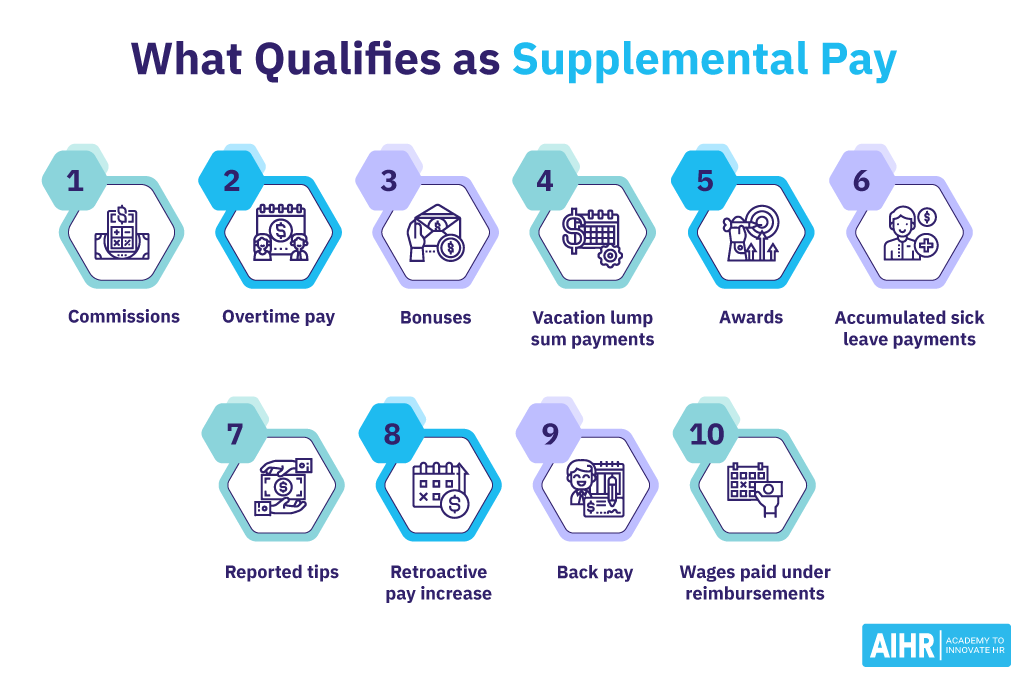Supplemental Pay
What is supplemental pay?
Supplemental pay is payments made to employees in addition to their normal pay. Supplemental wages are given outside the regular wages and include bonuses, commissions, overtime pay, severance package, sick leave payments, awards, and tips. The additional pay isn’t part of an employee’s regular salary, and it plays a key incentive role by enabling workers to work harder and attain desired job targets.
Regular pay includes a contracted hourly or monthly salary an employee receives. According to the IRS, supplemental wages aren’t subject to normal taxation, and specific outlines and rates are available concerning taxation on the same. However, employers can cluster overtime payments and tips as part of regular wages.
It’s important for HR practitioners and leaders to factor in the key role supplemental wages play when motivating workers. A basic pay structure that includes supplemental wages and a good income boosts the work culture in any setting.
Supplemental wages vs regular wages
Regular wages are paid to an employee on a payroll period, whether hourly, monthly or at an agreed time.
Supplemental wages are not part of the regular wages and are paid to an employee based on several incentives. Moreover, the two wage clusters vary when it comes to taxation rates.
In the US, supplemental wages are taxed using a flat rate of 22%, while regular wages are taxed according to withholding allowances and marital status. The IRS has set rules that manage the taxation of supplemental wages, which is done through the calculated flat rate percentage. Although regular wage taxes are calculated using a percentage method, the payroll period is annual.

What qualifies as supplemental pay
Supplemental pay includes earnings, not part of an employee’s base income. Employers or HR leaders can give employees supplemental pay as part of incentives or as a legal requirement when employees work overtime.
HR tip
Supplemental pay can be a sensitive issue, so provide employees with transparent and timely communication about it. Inform them about the criteria for receiving supplemental pay, such as meeting specific performance metrics, and communicate any changes in supplemental pay policies in advance.
Earnings that are part of supplemental wages include:
- Commissions
- Overtime pay
- Bonuses
- Vacation lump sum payments
- Awards
- Accumulated sick leave payments
- Reported tips
- Retroactive pay increase
- Back pay
- Wages paid under reimbursements, such as travel reimbursements.
Employers can opt for packaged overtime pay and tips as part of an employee’s regular wages.
What does not qualify as supplemental pay?
Not all additional payments are considered part of supplemental wages. The following payments aren’t part of supplemental pay:
- Paid time off (PTO). PTO is compensation paid to an employee for time away from work, noted as part of the employee’s income.
- Stipends. This is a fixed amount of money paid to a worker for specific purposes ranging from meetings, and travel expenses, among other things. Stipends aren’t paid for work done.
- Vacation pay: Vacation pay is part of an employee’s normal income.
How are supplemental wages taxed?
The rate at which an employee’s supplemental pay is taxed depends on how much one earns. In the US, employees who receive more than $1 million in a tax year are subject to a 37% tax rate. Your employee might have already submitted a Form W-4 seeking exemption from income tax withholding, but the flat rate of 37% is still obligatory.
However, if your employee hasn’t made more than $1 million in supplemental pay throughout a tax year, two conditions can be applied to make the calculations:
- If the supplemental and regular wages of the employee are combined, and the amount is unspecified, then you can refer to the employee’s Form W-4 to make the federal tax withholding.
- In cases where your employee’s supplemental pay is separate from the regular wage, a flat tax fee of 22% is applied.
In the case of paid time off (PTO) and vacation pay, they are considered part of supplemental wages when they are paid as part of your employees’ normal income. Normally, PTO and vacation pay are just replacements for your employees’ regular earnings when they aren’t present at work.
How to calculate supplemental pay
Supplemental pay can be paid separately or with your employees’ regular wages. If paid separately, the employees’ wages reaching up to $999,999 are subject to a flat 22% tax rate. The remaining amount is sustained as the additional pay through the tax year.
For example, if an employee earns incentives and additional pay amounting to $500,000, then after deductibles, their wages will be $390,000. A 37% flat rate is applied to supplemental wages amounting to $1 million and more.
Supplemental wages paid on top of regular wages introduce a different calculation bracket. The supplemental pay can be added to the regular wages from the preceding payroll year— figure the income tax withholding, subtract tax withheld from the regular wages, and withhold the remaining amount.
What should HR consider with supplemental pay?
HR practitioners and leaders should know the key details about supplemental pay, given the value it adds to a workforce. Essential points they should consider about supplemental pay include:
- Supplemental wages can be used as rewards and incentives to motivate your employees.
- Tracking and tabulating the progress of supplemental wages to your employees is important in maintaining transparency and financial accountability.
- The tax withholding rules should be complied with for any company to be tax compliant.
- Enlisting the help of other professionals in the HR and finance field departments is important to track tax compliance and navigate federal and state laws.







